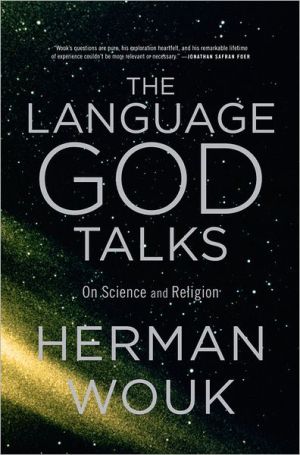

 |

|

The average rating for The Language God Talks: On Science and Religion based on 2 reviews is 2 stars.
Review # 1 was written on 2010-06-04 00:00:00 Jeremy Frommer Jeremy FrommerI was disappointed in this book on science and religion. After reading This is My God, a superb introduction to orthodox Judaism and a beautiful popular theistic apologetic in its own right, I was expecting similar greatness from The Language God Talks. But, in addition to rambling from random point to random point in his recollection of life, Herman Wouk decides to write in a strangely melodramatic style. One example paragraph: "So, outer space breached! The conquest of a new frontier brilliantly begun! Moon voyage dream of stargazers, poets, storytellers down the ages come true! Cold chaste goddess of the night ravished by an outward-bound primate, and fled for all time weeping to the dark side of the moon! Whither now, Homo sapiens? What does NASA do for an encore in space pioneering. Answer, plenty!" By page thirty, Wouk doesn't seem to have much to say, except that he admires agnostics scientists, he's bad at math, and calculus is the language God speaks. I'm reading this all and I'm having flashbacks to college, when I abandoned my plan to major in math and was asked sardonically by my academic advisor, a math professor, "And wither shalt thou goeth with thy English major?" A good chunk of the book is spent giving a sort of creative journalistic overview of the history of modern scientific (or perhaps more accurately technological) conquests. This may be fine if you're primarily interested in the "science" part of the subtitle, but if you're expecting, as I was, this long prologue to be some kind of a set-up for the grand theme of "science AND religion," you'll be let down. At page 68, we finally arrived at what I thought was going to be the point of the book. The rest of the book, I now thought, was going to be a response to the scientist Feynman's challenge that "the stage" of the universe "is too big for the drama" of God watching "human beings struggle for good and evil." So, arrival at point! Considerable introduction at length exhausted, profound treatise on science and religion to commence! Wither will Wouk next guide me, expectant reader? Religious, penetrating writer of fiction and theology, poised to glide his pen across awaiting page? What revelations on the theme of science and religion will he now pour forth? Answer, none! By page 92, he is still talking about the book he is GOING to write. Then, for the next several dozen pages after that he rambles about characters in his various books. These, apparently, are "pictures" that are presumably in some way connected to the grand theme of science and religion. I, unfortunately, had trouble grasping the connection. Finally, in the very last chapter, the book partially redeems itself with a conversation of some religious depth between Feynman and Wouk. (Even if it is clearly contrived and not at all believable as an exchange that even two brilliant men would have.) In the end, however, teiku--the question stands. Now, I respect choosing not to answer a possibly unanswerable question, but why write an entire book to say you aren't going to answer it? And what exactly was the question that Wouk was going to answer but didn't answer? I'm not even quite sure about that. One good thing did come out of reading this book. As much as I loved This is My God, and as much as I enjoyed Wouk's novels The Caine Mutiny and Winds of War and War and Remembrance and Aurora Dawn and City Boy, I was simply unaware that Wouk had written a more serious nonfiction work about Judaism titled The Will to Live On. Since he spends a good thirty percent of this book plugging his other books, I now know! And I will be adding it to my to-read list. |
Review # 2 was written on 2010-10-26 00:00:00 Curtis Robinson Curtis RobinsonOh, man -- this is going to be a difficult review to write. I often speak half-jokingly of my deep personal love for Herman Wouk, as if it's possible to feel an actual connection to an author you've never seen. But having loved Inside, Outside: A Novel, which Wouk refers to as his "novel-memoir" (the protagonist is clearly similar to Wouk, and his life follows a similar trajectory), I feel as if I know him even though we've never met. That, and Wouk's 90+ age, make me feel not a little twinge of guilt as I get ready to pan this book. Sorry, Herm, and all due respect and all that, but this book just didn't work for me. My brother affectionately calls this book "The Language God Rambles In," and with good reason. I simply couldn't keep track of the train of thought, if there was one. One minute we're talking about the space race, then we're dabbling in theology, a minute later we're giving a spotty history of some scientific discoveries, and then we're reminiscing over the writing and publishing experience of some of Wouk's books and offering some plot summaries, even excerpts. Wha? Skylar's excellent review () does an fantastic job of capturing the mishmash that is this book, and I recommend that you give it a read. Unfortunately, I can't say the same for the book itself, my undying love for Wouk himself notwithstanding. |
CAN'T FIND WHAT YOU'RE LOOKING FOR? CLICK HERE!!!